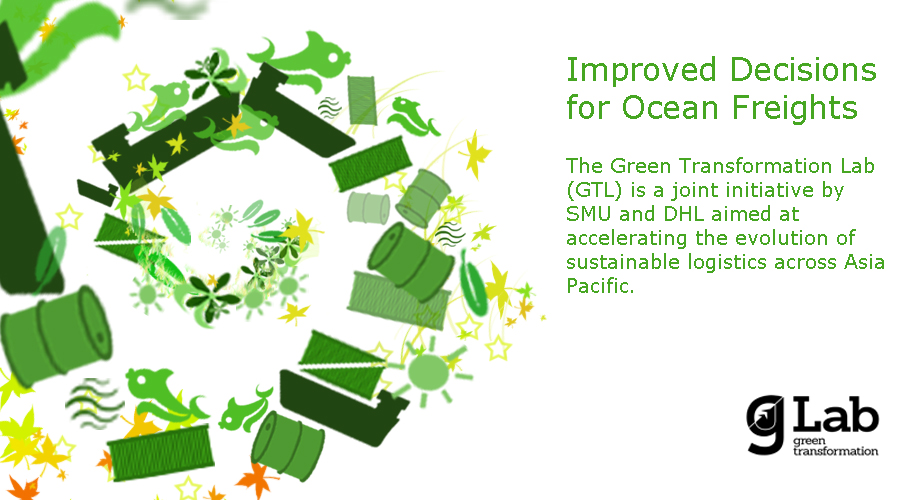Difference between revisions of "Improved Decisions for Ocean Freights Overview"
| (4 intermediate revisions by 2 users not shown) | |||
| Line 28: | Line 28: | ||
==Our Sponsor== | ==Our Sponsor== | ||
The Green Transformation Lab (GTL) is a joint initiative by SMU and DHL aimed at accelerating the evolution of sustainable logistics across Asia Pacific. Leveraging SMU’s multi-faculty academic excellence and DHL’s sustainability services, expertise and capability in supply chains, the Green Transformation Lab is focused on creating solutions that help companies transform their supply chains, becoming greener, more resource efficient and sustainable. <br/> | The Green Transformation Lab (GTL) is a joint initiative by SMU and DHL aimed at accelerating the evolution of sustainable logistics across Asia Pacific. Leveraging SMU’s multi-faculty academic excellence and DHL’s sustainability services, expertise and capability in supply chains, the Green Transformation Lab is focused on creating solutions that help companies transform their supply chains, becoming greener, more resource efficient and sustainable. <br/> | ||
| + | More information about general things that GTL does can be found at GTL official [http://gtl.smu.edu.sg website] | ||
| + | |||
==About the Project== | ==About the Project== | ||
As part of on-going effort to improve fill-rate of ocean freight, GTL needs a dashboard to visualize and allow decision-makers to select the most appropriate mode of shipment. There are two modes of ocean freight shipments: FCL (Full-container-load) and LCL (Less-than-container-load).<br/> | As part of on-going effort to improve fill-rate of ocean freight, GTL needs a dashboard to visualize and allow decision-makers to select the most appropriate mode of shipment. There are two modes of ocean freight shipments: FCL (Full-container-load) and LCL (Less-than-container-load).<br/> | ||
| Line 36: | Line 38: | ||
a. Ocean freight profiling for the selected customer<br/> | a. Ocean freight profiling for the selected customer<br/> | ||
b. Visualization of major trade-lanes (pair of source and destination of shipments)<br/> | b. Visualization of major trade-lanes (pair of source and destination of shipments)<br/> | ||
| − | c. Simple what-if analysis of a different mode of shipment is selected (e.g., customer choose LCL instead of FCL) on key defined KPIs such as cost, CO2 emissions | + | <s>c. Simple what-if analysis of a different mode of shipment is selected (e.g., customer choose LCL instead of FCL) on key defined KPIs such as cost, CO2 emissions</s><br/> |
| + | d. Cost analysis of the transactions | ||
==Our Team== | ==Our Team== | ||
| + | <center> | ||
| + | [[File:APTeamSmall.png]] | ||
| + | </center> | ||
Latest revision as of 12:31, 13 November 2015
Our Sponsor
The Green Transformation Lab (GTL) is a joint initiative by SMU and DHL aimed at accelerating the evolution of sustainable logistics across Asia Pacific. Leveraging SMU’s multi-faculty academic excellence and DHL’s sustainability services, expertise and capability in supply chains, the Green Transformation Lab is focused on creating solutions that help companies transform their supply chains, becoming greener, more resource efficient and sustainable.
More information about general things that GTL does can be found at GTL official website
About the Project
As part of on-going effort to improve fill-rate of ocean freight, GTL needs a dashboard to visualize and allow decision-makers to select the most appropriate mode of shipment. There are two modes of ocean freight shipments: FCL (Full-container-load) and LCL (Less-than-container-load).
Types of analysis:
The aim of this analytics project is to perform data analytics and build a dashboard using a visualization tool such as Tableau.
The features on the visualization tool includes (but not limited to):
a. Ocean freight profiling for the selected customer
b. Visualization of major trade-lanes (pair of source and destination of shipments)
c. Simple what-if analysis of a different mode of shipment is selected (e.g., customer choose LCL instead of FCL) on key defined KPIs such as cost, CO2 emissions
d. Cost analysis of the transactions

